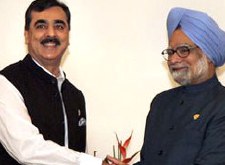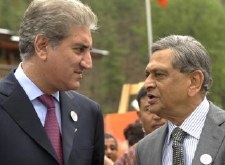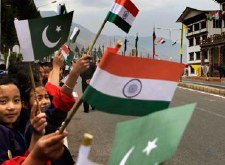Adil Najam
Much has been happening on the India-Pakistan scene. Much of it is good. But, given that this is India and Pakistan, ominous clouds of distrust are never very far away.
With the SAARC Summit gathering steam in Thimphu, Bhutan, there is much talk of a serious meeting and possibly some joint communique from Prime Ministers Yousuf Raza Gillani and Manmohan Singh. But with typical South Asian theatrics, doubts still linger on whether such a meeting will be held and whether something will come of it. A recently more confident Pakistani Foreign Minister is calling on India to move on from 26/11 to start forging better relations with Pakistan. And Indian opinion, jilted by the news of an Indian diplomat who was reportedly “spying” for Pakistan, is also in danger of being turned away from whatever good vibes have been created by the recent warming in the relations between the two neighbors and civil society initiatives such as Amn Ki Aasha, or glitterati gossip of the Shoaib Malik-Sania Mirza wedding, etc.
Much more importantly, perhaps, we have again been reminded by former Pakistani Foreign Minister Khursheed Mehmood Kasuri just how close the two countries were just a little while ago on a real and meaningful agreement on long-standing disputes, including on issues related to water management, to Kashmir, to economic cooperation, etc.
My colleague Moeed Yusuf and I recently published a research paper in the academic journal Third World Quarterly that looks at the history of the Kashmir issue between the Pakistan and India and undertook a detailed content analysis of every proposal made for its resolution in these 60+ years. In short, the analysis suggests that “the dispute may be more ‘ripe’ for resolution today than it has ever been in the past.”
As I have argued elsewhere, this does not mean that the dispute is ready to be resolved. It does mean that there is a opportunity today to improve these relations that must not be missed. But unless the leadership of the two countries really start talking, it will be missed. And that has been by central argument about India-Pakistan relations for many years now. As I said recently at a discussion organized by the Asia Society in New York (with me and Indian defense analyst Raja Mohan as the featured speakers), the simple fact is that “Not talking is never a good way to start talking.” Here is a video of my detailed argument and the ensuing discussion with Raja Mohan (my formal presentation starts around minute 14):
So, my plea for Thimphu and beyond Thimphu remains the same that it was before Thimphu. Please talk, Dear Prime Ministers. And please keep talking.























































I think its a good singe for both countries
It was an interesting discussion by both Dr. Adil Najam and Dr. Raja Mohan. I would tend to agree with Raja Mohan’s point that the progress in the peace process first begun by Vajpayee and Musharraf and continued after Manmohan Singh became PM was built on a “tripod” of understandings as he framed it – an assurance from Pakistan’s side to rein in terrorist groups and elements within the Pakistani establishment that nurtured them, an assurance from India’s side that it would engage in a results-oriented and time-bound negotiation (and not just talks for talks sake) on Kashmir and a agreement between both to take steps that would increase goodwill on both sides (so-called confidence building measures). These first two assurances were not fulfilled completely (major terrorist incidents continued to happen on India’s side even after the peace process, and negotiations on Kashmir took place in fits and starts). However, there was progress on both fronts, enough to keep the countries moving forward. By all accounts, a pact on Kashmir was ready to be signed. And I presume that a series of measures to dismantle the infrastructure of terrorism in Pakistan would also have been ready for implementation (otherwise the progress on negotiations on Kashmir would not have been possible). That equilibrium seems to have broken down.
Hence, the countries will either have to find a new equilibrium, or restore the earlier one. But I do think it cannot be restored without simultaneous assurances from the two countries that address the other’s legitimate concerns. Pakistan would need to assure India that it would completely dismantle the infrastructure of terrorism within its state apparatus and while it may have varying degree of control over non-state elements, that it would take all reasonable steps that any Government would take to prevent them from attacking India. India would need to assure Pakistan that it would move towards a time-bound resolution to Kashmir that can be acceptable to Pakistan and the Kashmiris, and that while it cannot be expected to ignore its own concerns, it would need to acknowledge that the current status quo is not sustainable. And they would need to agree to take the small baby steps that would make the big steps easier to take and to sell within their own countries.
It is difficult, but doable. Let’s see what comes out of the meetings of the foreign ministers.
Can any one name a single issue India has solved with any of its neighbor? What makes you think that they are interested in solving the problems with Pakistan?